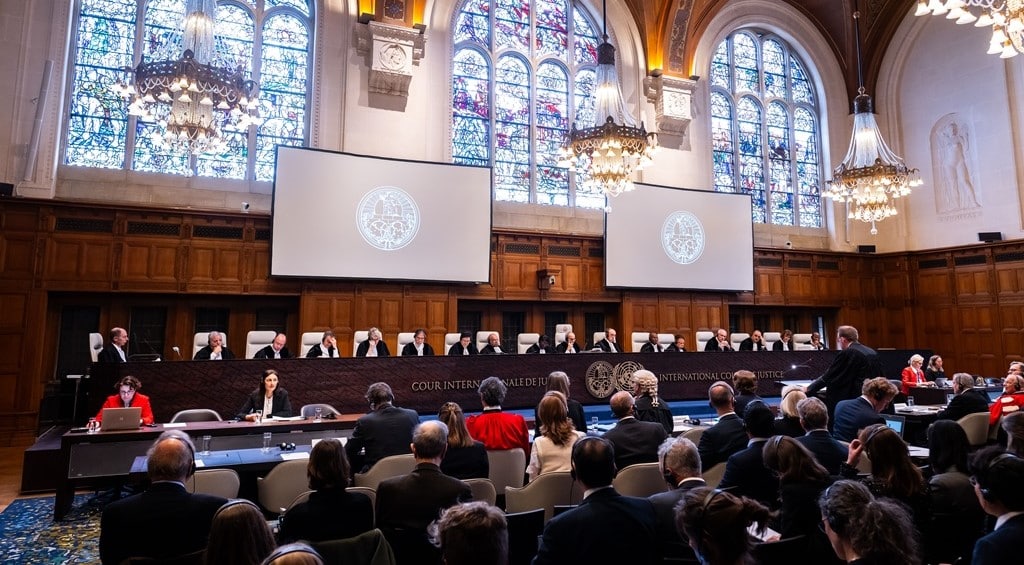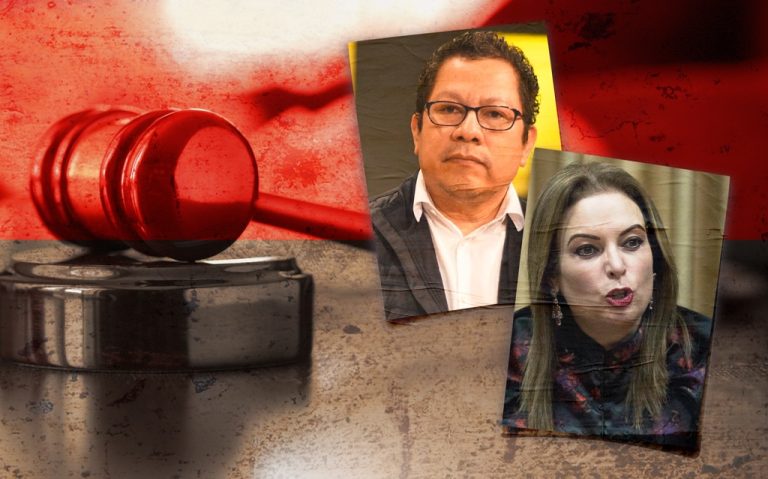7 de febrero 2022

ICJ Rules Against Nicaragua's Request For Germany to Halt Arms Sales to Israel

PUBLICIDAD 1M
PUBLICIDAD 4D
PUBLICIDAD 5D
They were found guilty of alleged “undermining” and “conspiracy”, concluding the first week of the political trials in “the new Chipote”

Journalist and presidential aspiring candidate of the Democratic Restoration Party (PRD), Miguel Mora and the former deputy of the Constitutionalist Liberal Party (PLC), María Fernanda Flores, were the last prisoners of conscience convicted in the first week of “single hearing” political trials held in the Directorate of Judicial Assistance, known as “the new Chipote”.
Yader Parajón, Yaser Vado, Ana Margarita Vijil, Dora María Téllez, and Lesther Alemán were the other five political prisoners convicted during this week for allegedly violating Law 1055 or Law for the Defense of the People's Rights to Independence, Sovereignty and Self-Determination for Peace, also known as “Sovereignty Law”.
Mora was found guilty of the crime of “undermining national integrity” by the pro-Ortega judge Nadia Camila Tardencilla, who at the last moment of the hearing changed the criminal case to “conspiracy”. The Prosecutor’s Office requested the maximum sentence of 15 years in prison for the journalist, and disqualification from holding public office.
María Fernanda Flores, former first lady and wife of former president Arnoldo Alemán (1997-2002), was found guilty of the crime of “conspiracy” and the Prosecutor's Office asked for eight years in prison plus disqualification from holding public office. The sentence for both political prisoners will be read on February 9.
CONFIDENCIAL confirmed that among the evidence presented in the process against Mora included: an interview he gave to “The Grayzone” in 2018, and four tweets. In three of those tweets, he shares journalistic articles from 100% Noticias, media of which he is the owner, referring to sanctions from the United States and the United Kingdom, and another where he thanked the secretary general of the Organization of American States (OAS), Luis Almagro, for pronouncing himself on the aggression that his wife, Verónica Chávez, suffered in October 2020.
“I thank you on behalf of my wife, Mr. Almagro, for your words. Nicaragua awaits the declaration of illegitimacy of this criminal Sandinista dictatorship, do not fail us” indicates the tweet presented as evidence by the Prosecutor's Office.
Said evidence “was sufficient” to prove the harm committed by Mora, according to Judge Tardencilla.
The lawyers of the prisoner of conscience were treated in an “aggressive” way by the judge during the hearing, who also demanded them not to “overstep” when they tried to assert their client’s right to defense.
The defense was not allowed to approach their client either before or during the trial, CONFIDENCIAL confirmed.
Unlike other political prisoners, Mora managed to express himself “extensively” during the trial, reiterating that he is “innocent” and that those who tried him were “perverting the course of justice”.
“I have not conspired against anyone, I am innocent,” he stressed.
During Friday's hearings, the Ortega justice system also allowed a family member to enter the courtroom. In Mora's case, his wife Verónica Chávez was the one who attended and had lunch at his side, although during the trial the police officers of “the new Chipote” prohibited her from even “turning to look at him”.
Chávez rejected the trial to which her husband Mora Barberena was submitted, describing it as “null and void” and reiterating that “he has not committed any crime” in an interview with 100% Noticias.
The Nicaraguan Center for Human Rights described the trial against Mora as “a judicial farce full of vices and irregularities”, denouncing that the process “persisted in the same format of repression, incommunicado detention of defense lawyers and exaggerated presence of riot police”.
Mora Barberena, who is also the owner of 100% Noticias, was arrested for the second time on June 20, 2021, three months after announcing his candidacy for the Presidency for the PRD party. In May of 2021, the Supreme Electoral Council (CSE) of the Sandinista Front ordered the cancellation of the party’s legal status in order to eliminate the electoral box of the National Coalition.
The communicator has been persecuted since April 2018, after he arranged for the programming of 100% Noticias to cover the social protests calling for the resignation of the leaders of the Sandinista Front for almost 24 hours a day.
The first time Mora was arrested occurred when the Ortega-Murillo regime's Police raided the facilities of Canal 100% Noticias, on December 21, 2018. On that occasion, the press chief of that media outlet, Lucía Pineda Ubau, was also imprisoned. Both were released in June 2019, after six months of imprisonment, ill-treatment and torture.
During the trial, María Fernanda Flores was also allowed the company of former President Alemán. The former Liberal deputy was detained on the night of June 21, 2021, at a time when the Ortega regime unleashed a hunt against the Nicaraguan opposition, in order to pave their way for presidential reelection in a process described as an “electoral farce”.
Along with presidential aspirants Cristiana Chamorro and Noel Vidaurre, and political commentator Jaime Arellano, Flores remained at her home under police custody and isolation, meaning that she had to be escorted to “the new Chipote” where the marathon trial was held.
Flores was removed from her position as deputy on November 26, 2020 and lost her parliamentary immunity. Deputy María Haydée Osuna, president of the Constitutionalist Liberal Party (PLC), promoted the motion against Flores. She also supported the Sandinista Front to strip the Citizens for Liberty (CxL) party of its legal status three months before the general elections.
“The fact that they have taken away my immunity and my constitutional rights through a vote that took place in an election, is one more demonstration of the type of government and dictatorship that we live in Nicaragua”, denounced Flores upon her exit from the Plenary in 2020, where she always tried to position herself as an opposition force to the regime; however, her image was always in the shadow of the acts of corruption committed by her husband, former President Alemán.
The political trials reactivated by orders of Daniel Ortega have been scheduled for the entire month of February against political prisoners, in the same facilities of “the new Chipote” where dozens remain incarcerated since the end of May 2021.
However, to carry out these processes in the prison facilities constitutes one more of the illegalities to the due process, according to the specialist in Criminal Law, María Asunción Moreno, in an interview with Esta Noche.
Lawyers who closely follow the cases against political prisoners agree with Moreno that judges cannot hold hearings outside the Judicial Complex, and that the exceptions established in Article 121 of the Code of Criminal Procedure only apply for “proceedings” that require the presence of the judge in his territorial jurisdiction.
However, they maintain that the exception does not apply in the case of these political trials, because neither the defense nor the Prosecutor's Office have requested that they be held in “the new Chipote”, the lawyer indicated.
Another of the illegalities is that the defenders of the political prisoners have not had access to their files - either completely or partially - nor have they been able to converse freely with the prisoners of conscience.
A lawyer who monitors the political trials assured CONFIDENCIAL that the exercise of technical and material defense is being violated in these processes, contrary to article 124 of the Code of Criminal Procedure (CPP), which establishes that “the parties may obtain simple copies of the judicial proceedings without any formality at their own expense”.
Also, he added, Article 34 of the Political Constitution of Nicaragua is violated, which in item 4 demands that “their intervention and due defense be guaranteed from the beginning of the process or procedure and to have adequate time and means for their defense”.
In addition, this January 31, the Public Ministry violated the presumption of innocence of the political prisoners, by calling them “criminals and delinquents” in a communiqué announcing the resumption of the trials.
“These same criminals and delinquents, have reoffended, attempted against the rights of the Nicaraguan people and society, compromising peace and security. They are the same ones who promoted and directed the terrorist acts of the failed coup attempt of 2018, having paralyzed the country and created damage to the economy; they are the same ones who have caused so much pain and mourning in the Nicaraguan family because of the murders, tortures and kidnappings,” the Public Ministry published.
Likewise, Ortega already condemned the political prisoners last November 8, in his most virulent speech against the political prisoners, in which he called them “sons of bitches of imperialism”.
The Ortega regime keeps more than 170 Nicaraguans imprisoned, and more than thirty of them remain in “the new Chipote,” under isolation, in punishment cells, suffering physical and psychological torture, as denounced by their relatives, who have only been able to visit them on five occasions during the more than six months of confinement.
Relatives of more than 30 political prisoners demanded the annulment of the trials and the unconditional release of all prisoners of conscience on January 30. Thereby, they joined another communiqué in which another group of relatives appealed to the support of “government leaders, the living forces of the nation and the (Catholic) Church” to “lead” a “process of citizen unification”, emphasizing that the liberation of the prisoners of conscience would serve “as a kind of liberation shared by all Nicaraguans”.
Following the communiqués, the Superior Council of Private Enterprise (Cosep), which had remained silent since September 2021, supported the demand for the release of the prisoners of conscience, and announced its willingness to support a national dialogue “without preconditions”, in the midst of the worst crisis of legitimacy of the Ortega regime, which had previously announced meetings with different economic sectors, without mentioning the Cosep.
Among the 39 political prisoners captured between May 28 and October 21 (including four under house arrest), 29 are accused of alleged conspiracy to commit mischief; seven others are accused of money laundering and other crimes; two are being investigated for violations to the “Sovereignty Law” and one for abusive management and misappropriation and improper retention.
The regime has used the package of repressive laws passed between October 2020 and February 2021 against the opposition, with Las 1055 or Law for the Defense of the People's Rights to Independence, Sovereignty and Self-Determination for Peace, better known as the “Sovereignty Law” being used the most. It facilitated the imprisonment of seven presidential aspirants, in addition to political, civic, student, peasant, ex-diplomats, journalists, activists, professionals and human rights defenders leaders.
It has also used the Special Law on Cybercrimes, known as the “Gag Law”, approved on October 27, 2020, which penalizes anyone who - according to the regime's criteria - disseminates “false news”.
Through this law, the Prosecutor's Office convicted Donald Margarito Alvarenga and Douglas Cerros Lanzas in January. Alvarenga was convicted for allegedly inciting “hatred and violence”, through Facebook publications and WhatsApp messages and for “subversion, disobedience and rebellion at the level of conspiracy to affect national integrity”; and Cerros for allegedly undermining national integrity and spreading false news.
This article was originally published in Spanish in Confidencial and translated by our staff
Archivado como:
PUBLICIDAD 3M
Confidencial es un diario digital nicaragüense, de formato multimedia, fundado por Carlos F. Chamorro en junio de 1996. Inició como un semanario impreso y hoy es un medio de referencia regional con información, análisis, entrevistas, perfiles, reportajes e investigaciones sobre Nicaragua, informando desde el exilio por la persecución política de la dictadura de Daniel Ortega y Rosario Murillo.
PUBLICIDAD 3D